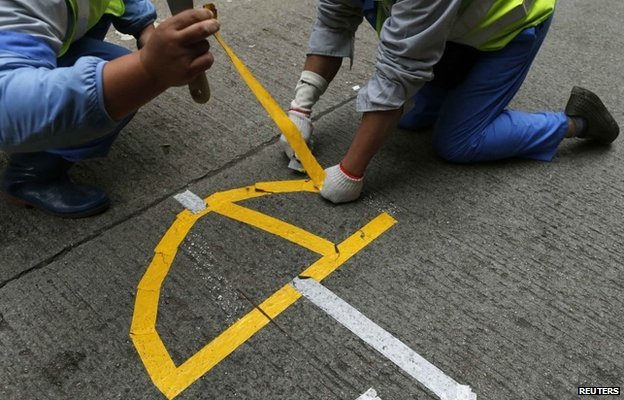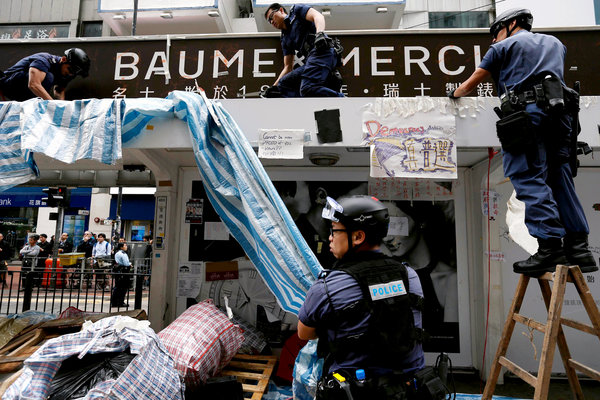
The mass protest has become known as the Umbrella movement. Hong Kong police have arrested several people as they cleared the last remaining pro-democracy protest site. (Photo courtesy/BBC/Reuters)
(TibetanReview.net, Dec17, 2014) – The democracy protest in China’s Special Administrative Region of Hong Kong has ended on Dec 15, 79 days after it began, with China gloating over its claimed success and the protesters insisting this was just the beginning of their fight for free elections. Whatever be the case, on Dec 15, authorities in Hong Kong began tearing down the last of the city’s pro-democracy camps, bringing a quiet end to two and a half months of street occupations that constituted the most significant political protest in China since 1989’s Tiananmen Square uprising in Beijing, reported time.com Dec 15.
All the three protest sites — in the Admiralty, Mong Kok and Causeway Bay districts — were set to go by Dec 16, with the streets being tidied up and returned to traffic, office workers and shoppers.
Beijing has refused to budge on the protesters’ insistence that the people of Hong Kong be given the right to freely elect by 2017 the head of the city’s government without a pro-establishment committee first handpicking the candidates. The Hong Kong government also refused to help, putting itself in the role of a local representative of the central government.
The report notes that after police used tear gas against protesters on Sep 28, tens of thousands rallied to the streets. Marching by the walls of the People’s Liberation Army barracks and the Hong Kong government’s headquarters, demonstrators unfurled umbrellas to protect themselves from police pepper sprays. The poignant image of ordinary Hong Kongers standing up to a foe like China with nothing but these everyday items gave birth to the movement’s name: the Umbrella Revolution, the report added.
And in the week before the end of the protest, more than 200 protesters, including leading democratic legislators, refused to leave the largest protest site as police and demolition crews approached it. In an action that lasted hours, police escorted — and sometimes carried — protesters off the pavement, one by one, toward a waiting police bus.

Nevertheless, in countless signs chalked on the roads, posted on walls, hung as banners and even floated into the sky on balloons, the protesters promised: “We will be back.”
During the removal of the main protest camp, the Admiralty, after its 75-day occupation, Officers made numerous arrests from a group of about a hundred demonstrators staging a final sit-in near the local Chinese People’s Liberation Army base, including prominent democratic legislators Emily Lau, Martin Lee and Alan Leong. Police also arrested high-profile protest personalities Jimmy Lai, a media mogul; Denise Ho, a popular singer; and Audrey Eu, a former lawmaker, the report added.
Student protest leader Alex Chow, who rallied the crowd over a microphone as the group awaited arrest, was among the last protesters escorted by police out of the former protest site on Dec 11.
A total of 955 people were arrested for committing various offences relating to the “illegal occupation” which lasted 79 days, while 75 people had turned themselves in, nvonews.com Dec 15 quoted Commissioner of Police Andy Tsang as saying.
Tsang has said officers were investigating the cases and that more arrests would be made soon, adding that all the investigations will be completed in three months.
The “Occupy Central” movement started on Sep 28 and blockaded several main roads and streets in busy areas in protest at Beijing’s decision on Aug 31 to restrict candidates for the 2017 chief executive election to those approved by a pro-China nominating panel.


